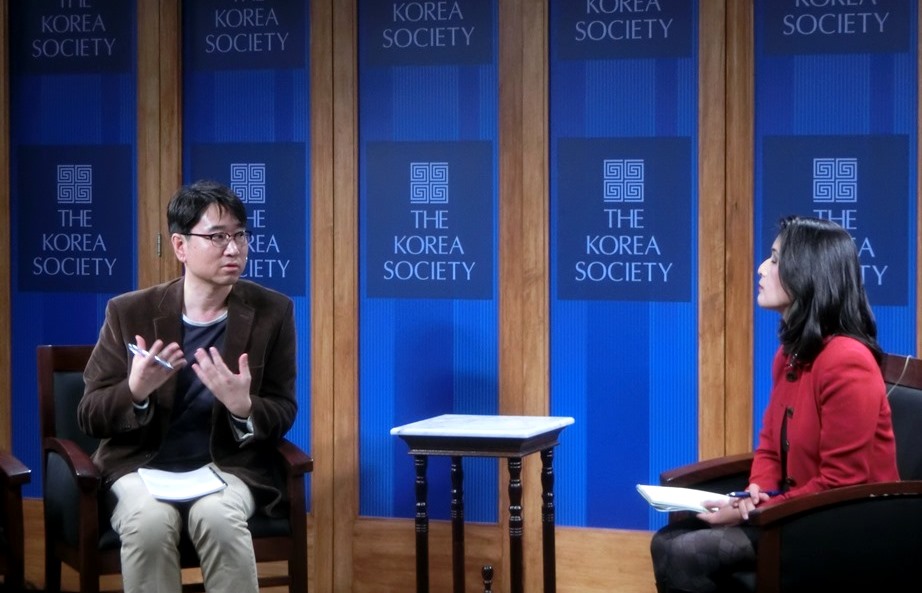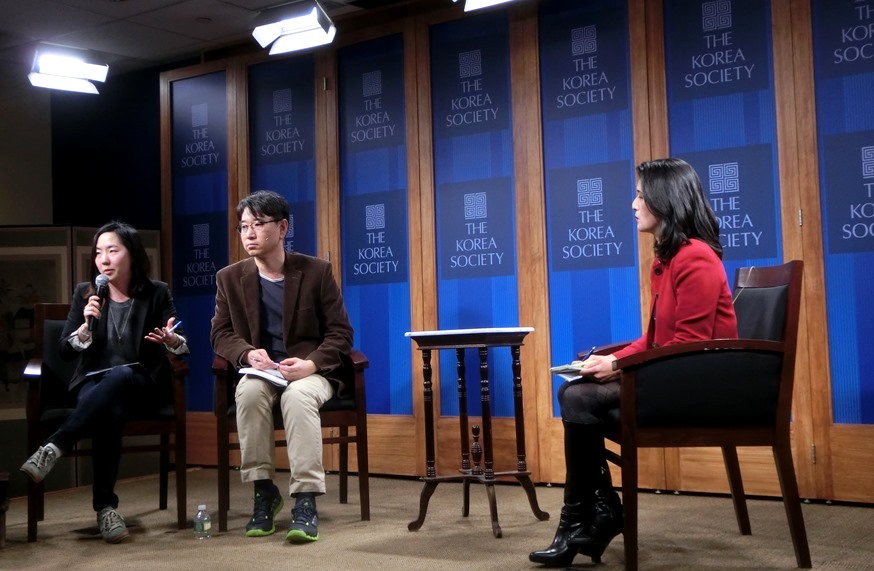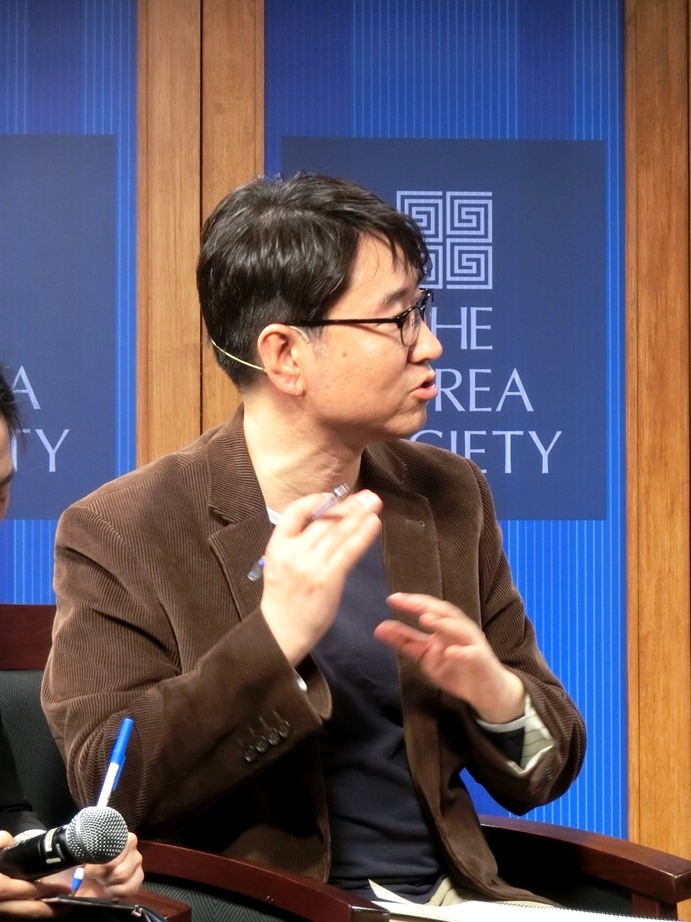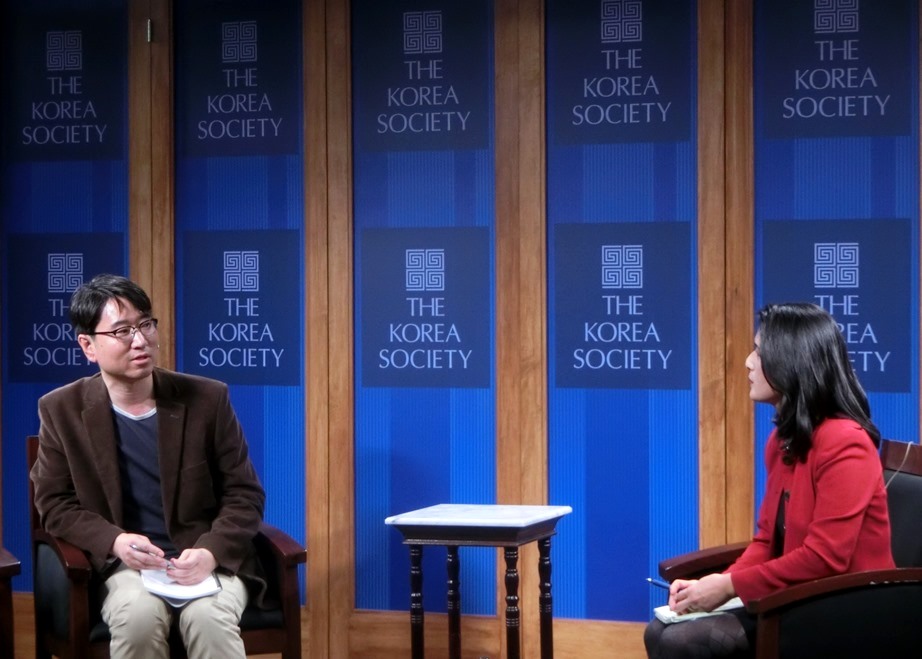By Ka Yee Chan
On April 16, The Korea Society featured Across Land, Across Sea. It is a documentary filmed by Hark-Joon Lee. Lee is a journalist, a documentary filmmaker, and also a well-known investigative reporter for The Chosun Ilbo, South Korea’s leading daily. It is an honor to have a chance to view the most realistic and dramatic stories of North Korean defectors.
Lee lived among North Korean defectors in China for five years. In this documentary, he focused on one family’s escape route. In the late 1990s, several unpleasant floods and the collapses of the Soviet Union cause widespread starvation in North Korea.
Many began to escape and try to seek their way to South Korea. Songgook and his wife, Sueryun, escaped from North Korea to South Korea. They settled down and were supported by a church organized by Pastor Kim. Sueryun was pregnant and worried about her family who were still in North Korea.
The common route to escape from North Korea is to go through the Tumen River, the border between China and North Korea. The Tumen River soon became a human market, human traffickers offered to help women escape and they sell the women once they cross the river.
Songgook had to meet Sueryun’s mother in China and hired a broker to bring her to South Korea. Since Songgook went to China by plane he had to return by plane.
Unfortunately, they heard the broker had abandoned Sueryun’s mother and she was captured by the Laos police and possibly returned to North Korea. Luckily, the Laos police had turned her to the South Korea Embassy instead. Sueryun would be able to meet her mother after six months.
Songgook had put his life at risk again in hopes of helping Sueryun’s aunt, cousin and brother to escape from North Korea as well. This time, they planned to escape by sea. Songgook will meet the family on the other side of the Tumen River in China. They will all leave China illegally by ship.
On the other hand, Pastor Kim will leave from South Korea to meet Songook and the family at the international waters between China and South Korea. Then the family will be handed to Pastor Kim’s ship, as Songgook will return to China. As a South Korean citizen, Songgook had to return to South Korea legally.
Of course, the plan didn’t go as planned. Pastor Kim’s ship was delayed for nine hours. Songgook’s ship was nearly flooded and could not return to China as planned instead he followed Pastor Kim’s ship to Korea.
The coast guards appeared as soon as the two ships stepped in the Korean waters. The family then was handed over to the coast guards where they were taken to the National Security Facility for six months of questioning and readjustments, then after they return to society. This is a very rare successful escape.
The journey of escapes cannot be described in just several paragraphs. This was months of trying to escape in fear, with anxiety and frustrations. Lee originally had no interest in filming this documentary. It is still unknown to him whether or not North Korea is that bad that people risk their lives in order to escape.
Here are Lee’s thoughts:
Question: How long did it take you to compile all the footage of the documentary? Lee: For this film, it took about two years. One thing I like to share with you before I start this interview is that I don’t have a very fluctuating emotional level. I was afraid my interview would be a bit flat. I hope you guys understand.
Question: This particular documentary took you two years, but you had been working on the North Korean defector issue for a lot longer, can you tell us how long?
Lee: I had been working on this issue for about 5 years. From 2007 to beginning of 2012.
Question: In your expert opinion, how common would you say these North Korean defector issues are?
Lee: From what I know, these days, there are not many who are defecting. Defecting occurred more in the 90’s when it was hard to survive. But now, people who were stuck in China are coming more to South Korea.
Question: What would you say the number of people stuck in China is?
Lee: The statistics vary. I would say about 50,000 to 100,000 defectors are still stuck in China.
Question: We see a lot of failures in escaping, and brokers abandoning the defectors, is it a typical scenario? Of the people who ask brokers to help, what percent would you say are successful?
Lee: First I want to tell you what I saw when I first started filming. What I saw is only a part. I don’t want to generalize my experience as the whole experience of the North Korean defectors. Some defectors they crossed the border of the Tumen River to China and got caught by the police in China. I would say there is a high possibility of failure, but I wouldn’t be able to give a definite number.
Question: What is the typical escape from North Korea to South Korea?
Lee: The typical route would be…first to cross the border to China, the typical route takes around 10 to 14 days. Then the North Korean defectors enter in Laos then into Thailand to seek asylum. These days, conditions got better. They can actually seek asylum right from Laos not going into Thailand.
Question: The worst scenario would be they get captured along the way. What happens to them at that point?
Lee: So if you got caught crossing the border, most cases you would be recaptured back to North Korea.
Question: And what happens to them back in North Korea?
Lee: These people will be sent to prison camps where there are force labors and executions, but these days executions are the norm, it’s been dying down.
Question: Why do they risk their life and family’s life to escape? Is it politically motivated or is it because of starvation?
Lee: When I first started out filming this documentary, it seems to be the easiest question. But after five years looking back, it becomes the hardest question that I keep asking myself. When I first started, I thought simply that they are defecting, because North Korea is a bad country and people are starving there. But after five years, I question myself. Is North Korea 100% really bad? I came to the conclusion that they are defecting for hope. The original name of the documentary is Crossing Heaven’s Border. I had been asked many times if this heaven means North Korea, because it was known as heaven in a public talk, but to me it is a metaphor for South Korea and defectors are trying to step in land of a better life.
Question: You are more concerned with the human-interest aspect of the North Korean situation instead of the political side. You also mentioned you actually have no interest in covering this topic at all, can you tell us about that?
Lee: I actually have no interest in covering this issue whatsoever. In my earlier days, I actually wanted to become a movie director. If I were to become a journalist, I want to write movie reviews, but I happen to cover social issues in South Korea and I went on in covering Internet technology issues.
Question: Over the years while you are covering the story, it had affected you personally. How has it affected you?
Lee: If there any people from the younger generation, I want to say study when you can and have an open-mind for social issues. Keep your eyes open. The reason why I am telling you this is because when I was filming I was learning with experiences. During the filming, I was constantly asking myself, ‘Am I doing the right thing and asking the right questions?’ You really have to think and ask yourself many questions when you are young.
It was an honor to hear Lee’s experiences living among the North Korean defectors, as well as his own personal thoughts. As he communicated, it is important to keep our minds open. The world is bigger and wider than we may think.
In 2009, a PBS edited version of his documentary, Crossing Heaven’s Border, was aired in the U.S. It received Amnesty International’s Best in Human Rights Journalism Award and a 2010 Emmy Award nomination. For Across land, Across Sea, he was nominated for a second Emmy Award in 2012. Lee recently directed his first feature-length documentary, 9 Muses of Star Empire. If you are interested, look out for Hark-Joon Lee’s work.




Leave a Reply